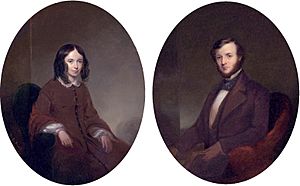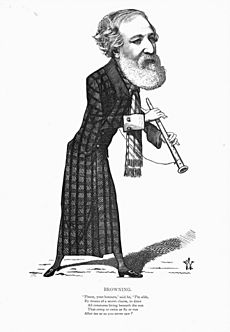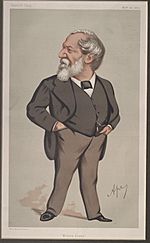Robert Browning facts for kids
Quick facts for kids
Robert Browning
|
|
|---|---|
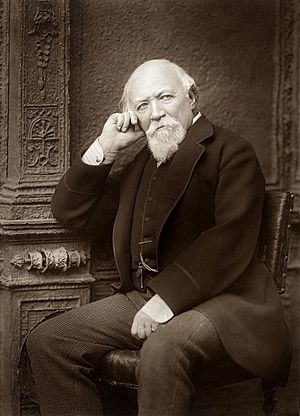
Browning, c. 1888
|
|
| Born | 7 May 1812 Camberwell, London, England |
| Died | 12 December 1889 (aged 77) Venice, Italy |
| Resting place | Westminster Abbey |
| Occupation | Poet |
| Alma mater | University College London |
| Literary movement | Victorian |
| Notable works | "The Pied Piper of Hamelin", Men and Women, The Ring and the Book, Dramatis Personae, Dramatic Lyrics, Dramatic Romances and Lyrics, Asolando , "My Last Duchess" |
| Spouse | |
| Children | Robert Wiedeman Barrett "Pen" Browning |
| Relatives | Robert Browning (Father); Sarah Anna Wiedemann (Mother) |
| Signature | |
Robert Browning (born May 7, 1812 – died December 12, 1889) was a famous English poet and writer. He lived during the Victorian era, a time when Queen Victoria ruled England. Browning is best known for his special kind of poems called dramatic monologues. In these poems, a character speaks directly to the reader, revealing their thoughts and feelings.
Browning's poems often used interesting characters and settings. He was known for his clever writing and sometimes challenging words. He wrote many important works, including "The Pied Piper of Hamelin" and "My Last Duchess". His work made him one of the most important poets of his time.
Contents
Robert Browning's Life
Growing Up in London
Robert Browning was born in Walworth, a part of London, England. His birthday was May 7, 1812. His father, also named Robert Browning, worked for the Bank of England. He earned a good salary. Robert's father loved books and had a huge library of about 6,000 books. This meant Robert grew up surrounded by many stories and ideas.
His mother, Sarah Anna, was a very religious and talented musician. Robert was very close to her. He also had a younger sister, Sarianna, who was also gifted. She became his companion later in life. Robert's parents encouraged him and his sister to explore literature and art.
Education and Early Poetry
Robert did not like school much. He went to a few private schools but preferred to learn at home. His father's large library was his main classroom. By the age of 14, he could speak French, Greek, Italian, and Latin very well. He admired the Romantic poets, especially Shelley.
At 16, he studied Greek at University College London. However, he left after his first year. His parents' strong religious beliefs meant he could not go to Oxford or Cambridge. These universities were only open to members of the Church of England back then. Robert was also very musical, like his mother. He chose to focus on writing poetry instead of a formal career. He lived at home and depended on his family until he got married. His father even helped pay to publish his first poems.
First Published Works
In 1833, Robert Browning published his first long poem, "Pauline, a Fragment of a Confession". He paid for it himself with money from his aunt. This poem was written in the style of Shelley. Some newspapers noticed the poem and praised it. However, it did not sell any copies. Later, Browning felt a bit embarrassed by this early work.
In 1835, he published "Paracelsus". This poem was about a 16th-century scientist and alchemist. It was more successful and caught the attention of famous writers like Wordsworth and Dickens. This helped him become known in London's literary world. He even wrote a play called "Strafford", which was performed a few times.
In 1840, Browning published a long poem called "Sordello". It was set in Italy during old wars. This poem was very difficult to understand. Even other famous writers joked that they could only understand the first and last lines! After this, Browning's reputation suffered for a while. But he started to recover with a series of pamphlets called "Bells and Pomegranates" (1841–1846), which included some of his "dramatic lyrics."
Love and Life in Italy
In 1845, Browning met another poet, Elizabeth Barrett. She was six years older than him and lived as a semi-invalid. They started writing letters to each other, and soon they fell in love. They got married secretly on September 12, 1846. Elizabeth's father was very strict and did not approve of his children marrying. He disinherited Elizabeth, meaning she would not get any money from him.
After they married, the Brownings moved to Italy for Elizabeth's health. They lived first in Pisa and then in Florence at a place called Casa Guidi. This house is now a museum. Their only child, Robert Wiedemann Barrett Browning, nicknamed "Pen," was born in 1849. Robert Browning loved Italy and said it was like his university. The couple was happy and comfortable there.
Major Works and Growing Fame
While in Florence, Browning worked on a collection of poems called "Men and Women" (1855). These poems are now very famous, but they did not get much attention when first published.
In 1861, Elizabeth died in Florence. The next year, Browning returned to London with his son, Pen, who was 12. His reputation began to grow when he became part of the London literary scene. He still visited Italy often.
In 1868, after five years of work, he published his long poem "The Ring and the Book". This poem was based on a real murder case from Rome in the 1690s. It had 12 parts, mostly dramatic monologues from different characters. It was a huge success and finally made Browning famous. A society was even formed in 1881 to study his work.
Later Years and Death
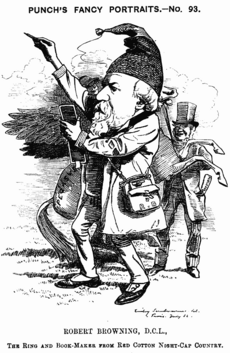
In his later years, Browning traveled a lot. He wrote more long poems in the 1870s. He also wrote "Parleyings with Certain People of Importance in Their Day" (1887). This book showed the poet speaking in his own voice. His last book of poems, "Asolando", was published on the day he died.
Robert Browning died at his son's home in Venice, Italy, on December 12, 1889. He was buried in Poets' Corner in Westminster Abbey in London, right next to another famous poet, Alfred Tennyson. During his life, he received many honors, but he usually turned down anything that involved public speaking.
Hearing His Voice from the Past
On April 7, 1889, a special event happened. At a dinner party, a recording of Browning's voice was made on an Edison cylinder phonograph. This was a very early recording device. In the recording, Browning recites part of his poem "How They Brought the Good News from Ghent to Aix". You can even hear him apologize when he forgets some words!
When this recording was played in 1890, after his death, people said it was the first time anyone's voice "had been heard from beyond the grave." It is one of the oldest surviving recordings of a famous person in the United Kingdom.
Robert Browning's Legacy
Robert Browning is still highly regarded today. Many famous writers have admired his work. His poems have influenced modern books and stories.
Some of his most famous and important poems include "Childe Roland to the Dark Tower Came", "Fra Lippo Lippi", "Andrea Del Sarto", and "My Last Duchess". His most popular poems, especially for younger readers, are "The Pied Piper of Hamelin" and "How They Brought the Good News from Ghent to Aix".
Browning is also known for some famous lines from his poems, like:
- "Grow old along with me!" (from "Rabbi Ben Ezra")
- "A man's reach should exceed his grasp" (from "Andrea Del Sarto")
- "God's in His heaven—All's right with the world!" (from "Pippa Passes")
His unique dramatic monologues are a big part of his legacy. In these poems, the character speaking often accidentally reveals more about themselves than they mean to. This makes his poems very interesting to study.
List of Works
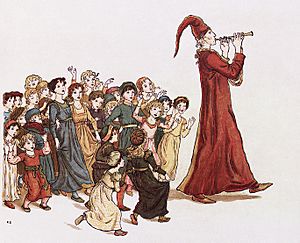
Here is a list of the plays and poetry books Robert Browning published during his life:
- Pauline: A Fragment of a Confession (1833)
- Paracelsus (1835)
- Strafford (play) (1837)
- Sordello (1840)
- Bells and Pomegranates (1841–6)
- Bells and Pomegranates No. I: Pippa Passes (play) (1841)
- The Year's at the Spring
- Bells and Pomegranates No. II: King Victor and King Charles (play) (1842)
- Bells and Pomegranates No. III: Dramatic Lyrics (1842)
- Porphyria's Lover
- Soliloquy of the Spanish Cloister
- My Last Duchess
- The Pied Piper of Hamelin
- Count Gismond
- Johannes Agricola in Meditation
- Bells and Pomegranates No. IV: The Return of the Druses (play) (1843)
- Bells and Pomegranates No. V: A Blot in the 'Scutcheon (play) (1843)
- Bells and Pomegranates No. VI: Colombe's Birthday (play) (1844)
- Bells and Pomegranates No. VII: Dramatic Romances and Lyrics (1845)
- The Laboratory
- How They Brought the Good News from Ghent to Aix
- The Bishop Orders His Tomb at Saint Praxed's Church
- The Lost Leader
- Home Thoughts from Abroad
- Meeting at Night
- Bells and Pomegranates No. VIII: Luria and A Soul's Tragedy (plays) (1846)
- Bells and Pomegranates No. I: Pippa Passes (play) (1841)
- Christmas-Eve and Easter-Day (1850)
- Men and Women (1855)
- Evelyn Hope
- Love Among the Ruins
- A Toccata of Galuppi's
- Childe Roland to the Dark Tower Came
- Fra Lippo Lippi
- Andrea Del Sarto
- The Patriot
- The Last Ride Together
- Memorabilia
- Cleon
- How It Strikes a Contemporary
- The Statue and the Bust
- A Grammarian's Funeral
- An Epistle Containing the Strange Medical Experience of Karshish, the Arab Physician
- Bishop Blougram's Apology
- Master Hugues of Saxe-Gotha
- By the Fire-side
- Dramatis Personae (1864)
- Caliban upon Setebos
- Rabbi Ben Ezra
- Abt Vogler
- Mr. Sludge, "The Medium"
- Prospice
- A Death in the Desert
- The Ring and the Book (1868–69)
- Balaustion's Adventure (1871)
- Prince Hohenstiel-Schwangau, Saviour of Society (1871)
- Fifine at the Fair (1872)
- Red Cotton Night-Cap Country, or, Turf and Towers (1873)
- Aristophanes' Apology (1875)
- Thamuris Marching
- The Inn Album (1875)
- Pacchiarotto, and How He Worked in Distemper (1876)
- Numpholeptos
- The Agamemnon of Aeschylus (1877)
- La Saisiaz and The Two Poets of Croisic (1878)
- Dramatic Idyls (1879)
- Dramatic Idyls: Second Series (1880)
- Pan and Luna
- Jocoseria (1883)
- Ferishtah's Fancies (1884)
- Parleyings with Certain People of Importance in Their Day (1887)
- Asolando (1889)
- Prologue
- Summum Bonum
- Bad Dreams III
- Flute-Music, with an Accompaniment
- Epilogue
See also
 In Spanish: Robert Browning para niños
In Spanish: Robert Browning para niños


